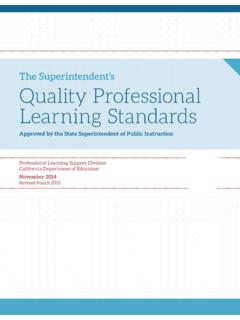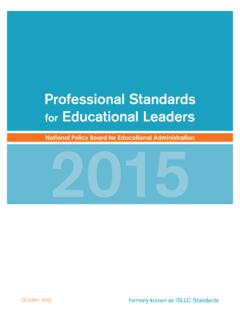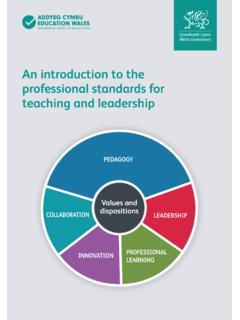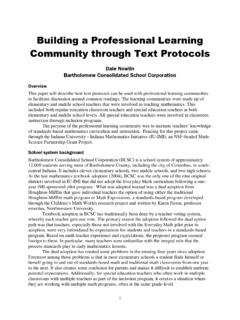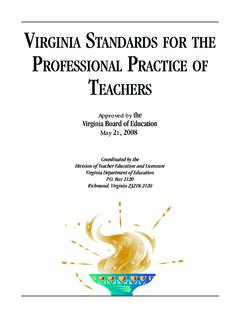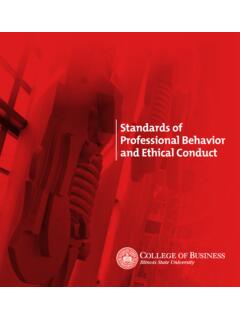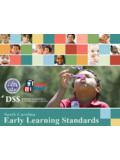Transcription of Professional Standards and Professional Learning: A ...
1 L. Sparrow, B. Kissane, & C. Hurst (Eds.), Shaping the future of mathematics education: Proceedings of the 33rd annual conference of the Mathematics Education Research Group of Australasia. Fremantle: MERGA. 780 Professional Standards and Professional learning : A Position Paper Karen McDaid University of Western Sydney The educational discourse in recent years in Australia, and in particular NSW has been on advancing the status of the teaching profession through the development of a framework of Standards , and by supporting the nature of teachers work in addition to improving student- learning outcomes. The close link between student learning outcomes and quality mathematics teaching has resulted in the call for an increase in teacher accountability and quality.
2 This paper is an exploration of the relevant literature that focused on the professionalisation of the teaching profession in Australia and its potential impact on teaching in Australia. It is thought that the educational reform movement began on a global scale in the mid 1980s and continued into the 1990s. Its purpose was to improve teaching practice and lift student performance after previous efforts had failed to make the changes that were sought. This reform appears to have been motivated by an international convergence towards educational uniformity, teacher accountability and Standards based compliance and it has become a worldwide focus (Delanshere & Petrosky, 2004; Sachs, 2003).
3 In Australia in the mid 1990s the Australian Association of Mathematics Teachers (AAMT) (2006) began the debate around the issue of Professional teaching Standards for mathematics as they stood within the Australian context. The purpose for developing a set of Standards for teachers was to clearly articulate the specialist nature of the teaching of mathematics so as to inform the community and stakeholders about what quality teaching of mathematics is (Althorp, 2001). In many cases Standards based education are thought to provide the magic ingredient to all educational ills (Sachs, 2003). However, the truth might be that teachers are in danger of being overburdened with guidelines and Standards to which they must measure and provide evidence of their accomplishments within their profession rather than engage in the business of education.
4 Historically, teaching is one of the few professions where a beginning teacher assumes the same responsibilities as one who has been teaching for a number of years (Garvey, 2004). For many pre-service and graduate teachers this can appear to be a significant and somewhat daunting task that relies on their personal beliefs about mathematics and their teacher preparation programs. Beginning teachers have consistently expressed that pre-service teacher education courses are too theoretical and that the experiential processes of teaching are disregarded. Grenfell (1996) argues that in some settings the best place for quality teacher education is within the construct of the school.
5 The dichotomies appear when the opposing notions such as theory versus practice, or school training versus institutional training, are influenced by an ever-changing political agenda, which can be argued, have a positive or a negative impact on teacher education according to the context. The influence of governmental policy on the culture of the teaching profession over many years is largely due to inadequate or insufficient research into how Professional competence is achieved by an early career teacher. Yet policy changes are readily accepted as part of the culture of teaching (Grenfell, 1996). Motivating teachers to participate in Professional learning appears to be straightforward, as is the development of politically motivated educational policy; the difficulty lies in the implementation of the policy as its success relies on teachers 781 awareness of its value and their ongoing and enthusiastic participation (Collinson et al.)
6 , 2009). Kleinhenz and Ingvarson (2004) express their concern about the risk of teachers not seeing the value in Standards based policy and fear there may be a danger of disconnectedness as a result of bureaucratically conceived and executed evaluation schemes (p32), potentially resulting in failure. Additionally, the apparent efficient implementation of policies can give the impression that management and administration are monitoring the processes, when in some cases the location of the core business of teaching, the classroom, isn t visited as part of the evaluation process (Kleinhenz & Ingvarson, 2004).
7 As Grenfell (1996) notes: .. what is at stake is whether Professional learning is seen as unfolding developmental and implicit, or a profession through a pre-set list of explicit competencies. These two approaches on professionalization are based on opposing views of training: the former sees it as personal and context dependent; the latter as the acquisition of definable skills. ( ) The evidence from previous research suggests that positive self-efficacy in mathematics can have a profound effect on both teaching practice and student learning (Wilson, 2008). Unfortunately, for many primary school teachers their negative memory of school mathematics may have created a cycle of anxiety, which can influence their practice to reflect their own school experience.
8 This can potentially result in them resorting to teaching in the manner in they were taught, in conflict with current recommended practice (Hodgen & Askew, 2007; White-Clark, 2008). Similarly, the negative beliefs of individuals may remain rigid and unalterable whilst their current models of beliefs produce reasonable results and they may attribute failures to external forces rather than reflecting on their own practice (Duffy, 2003). Variables that influence pedagogical practice include curriculum, familiarity with content, needs of the students and external pressures from school and parents.
9 Some teachers can be guilty of using set of prescriptive standard procedures for teaching mathematics as a result of managing these external pressures, which can be a contributing factor in the disengagement of students in the mathematics classroom (Boaler, 2000). It is argued the greatest positive influence on pedagogical practice and self-efficacy is further education, on-going Professional development in addition to developing knowledge, skills and gaining an excellent understanding of the pedagogical content knowledge, the knowing how to and what to teach (Beswick, Watson, & Brown, 2008; Ross, 2002). According to Feiman-Nemser, (1983) the first five to seven years of teaching is when teachers learn how to teach and Professional development and on-going learning is highly valued both in the educational setting and by Australian teachers, resulting in a high level of influence on practice (McCullan, 1994).
10 Professionalising the Profession Over the past several years there has been a move towards promoting the professionalism of teachers through the development of teaching Standards both internationally and in Australia. In 2001 the Commonwealth Government established a project known as the Quality Teachers Initiative, Teachers for the 21st Century, where four national teacher associations worked collaboratively to develop a set of Standards that were specific to their subject matter and collectively could provide a framework for future development of teaching Standards (Althorp, 2001). In 2002 the Australian Association of Mathematics Teachers designed a set of Professional teaching Standards and a program of assessment that concentrated on identifying the knowledge skills and attributes that teachers of mathematics comprise.











